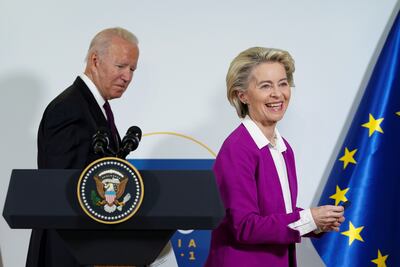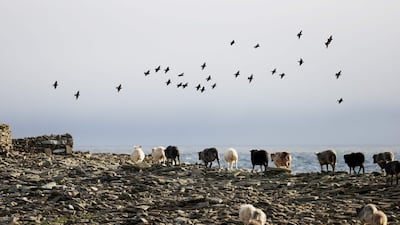The EU and US are hopeful of a Cop26 agreement to cut methane emissions, in what experts said could be a crucial step in tackling climate change.
Dozens of countries are expected to support a pledge to reduce methane output by 30 per cent this decade.
At least two dozen countries have publicly backed the push led by Brussels and Washington, and EU leaders said they expect the support of 60 countries when the pledge is formally proposed in Glasgow.
Methane is the gas responsible for at least a quarter of global warming, the UN said.
Although it does not linger in the atmosphere as long as carbon dioxide, methane is more potent when trapping heat, meaning timely emissions cuts could be highly beneficial for the environment.
The colourless gas comes from a mixture of sources including livestock, rice farming and fossil fuel extraction.
President of the European Commission Ursula von der Leyen said methane was the lowest-hanging fruit in terms of emissions cuts.
“It is 80 times more warming than CO2, so there is an urgent need to do something, and there is a lot we can do,” she said this week.
US President Joe Biden has promised to address leaky gas pipelines, one of the sources of methane emissions, as part of a $1.75 trillion spending package.
National Security Adviser Jake Sullivan said Washington hoped to “substantially add” to the number of countries promising to cut emissions.
The UN’s environment programme used the eve of Cop26 to announce the launch of a methane observatory to track emissions.
It said the database “fills an urgent need and creates a sound, independent scientific basis for methane emissions action”.

Pledge backers
Early backers of the 30 per cent pledge included Britain, Italy, Iraq, Indonesia and Mexico. France, Germany, Canada and Japan have publicly joined the campaign.
The pledge suffered a blow when Australia announced it would not sign up because of its concerns about the effect on its farming industry.
But New Zealand, a major emitter with its dairy and sheep industries, said it was considering adding its name to the pledge.
Philanthropic donors have promised $200 million towards global emissions cuts, the US and EU said.
UN experts said large cuts in methane emissions could prevent nearly 0.3ºC of global warming by 2045. The aim of the climate talks is to stop temperatures rising more than 1.5ºC above pre-industrial levels.
But the UN estimates that this would require emissions cuts of 45 per cent, rather than 30 per cent, by the end of the decade.
Methane levels in the atmosphere are at their highest for about 800,000 years, scientists believe.
The World Wide Fund for Nature said Arctic nations had a particular role to play because thawing polar permafrost releases methane in large quantities.
“Taking action now to drastically reduce methane emissions, in addition to slashing other greenhouse gases emissions, could have a significant impact on the climate,” it said.


